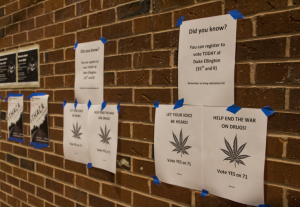
Fliers in Red Square, not signed by any group, urged students to vote in support of Initiative 71 to legalize marijuana in D.C. in today’s election.
D.C. voters will head to the polls today to vote on Initiative 71, a proposal that would legalize the use and cultivation of recreational marijuana in the District.
If the initiative is passed, adults over the age of 21 will be legally allowed to possess up to two ounces of marijuana. The initiative will also permit the home cultivation of up to six marijuana plants as long as only three or fewer are mature. Although the sale of marijuana will still be prohibited, up to one ounce of marijuana will be able to be given as a gift, and the sale of products for the use or cultivation of marijuana will be legalized.
A recent Washington City Paper poll placed support for legalization at 52 percent.
In anticipation of the initiative’s passage, the D.C. Council passed a bill on Oct. 28 to seal the criminal records of D.C. residents who have been convicted of non-violent marijuana-related crimes.
“We need to say to people previously charged with these crimes that they don’t need to have it impact their lives forever,” Councilmember at Large David Grosso (LAW ’01), who introduced the bill, told The Hoya. “The point is to give a little bit back to the people most impacted by the failed war on drugs.”
If the initiative passes, it must undergo a 60-day Congressional review period. In 1998, D.C. residents voted to legalize medical marijuana, but Congressional delay tactics prevented the council from implementing the plan until 2009. Since such action would require approval from the Senate, the House and the president, the current political climate makes a delay from Congress unlikely.
If Congress or the D.C. Council does not act within those 60 days, the initiative will become law.
The initiative does not permit sale of marijuana, only possession. Grosso noted that the D.C. Council will likely delay the implementation of legalization until the creation of a comprehensive tax-and-regulation system. Grosso already introduced a bill to add this regulatory framework but expected the process to take a year, if not longer.
“Sometime between Oct. 1 and Jan. 1 of next year is plenty of time for us to get the regulatory framework in place and have a marketplace where you can buy and sell marijuana legally,” Grosso said.
Together with the D.C. Cannabis Campaign, the Drug Policy Alliance, the nation’s leading organization against the war on drugs, has led the campaign in support of Initiative 71.
Drug Policy Alliance Office of National Affairs Policy Manager Malik Burnett said that the money gained from taxing and selling marijuana could help solve the disparity in economic outcomes throughout the District, estimating profits from the industry at tens of millions of dollars each year.
“What we can do once we effectively tax and regulate marijuana is to use the proceeds from that taxation to appropriately reinvest in the development of those communities,” he said.
If Initiative 71 passes, D.C. will join Colorado and Washington to become the third place in America where recreational marijuana is legalized.
Students who are registered as D.C. voters will be able to vote on Initiative 71. The ballot will reiterate the suggested parameters of marijuana use and possession.
Students posted signs in Red Square that encouraged students to vote on behalf Initiative 71. “Let your voice be heard! Vote yes on 71,” one of the signs said.
Ari Shapiro (SFS ’18), a resident of Denver, said he supports legalization for the District, provided that D.C. follows Colorado’s model, noting that the legislation has not significantly changed life in his home state.
“[Legalization] reduces excessive prison costs and incarceration rates it raises significant tax revenues, and it allows a potentially dangerous substance to be controlled and regulated,” Shapiro said. “In Colorado, legalization hasn’t radically altered society as many thought it might, and D.C. should be no different.”
Students registered to vote in D.C. can vote Tuesday at the Georgetown Community Library, located on R Street. Other elections on the ballot are the D.C. mayoral race, delegate to the U.S. House of Representatives, Chairman of the Council, At-Large member of the Council, D.C. Attorney General, U.S. Senator, U.S. Representative and Advisory Neighborhood Commissioner.














